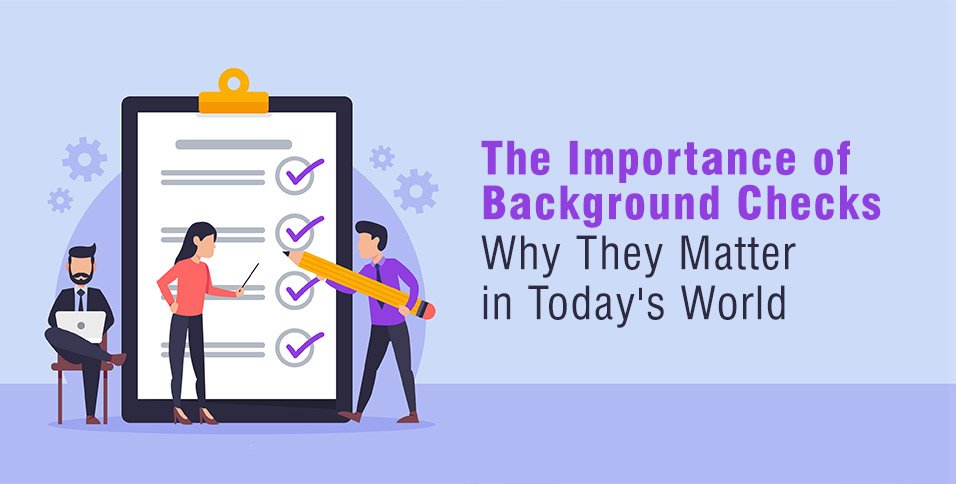In today’s interconnected and fast-paced world, the importance of background checks cannot be overstated.
Whether in employment screening, tenant verification, or personal relationships, conducting thorough background checks is crucial in safeguarding individuals, businesses, and communities from potential risks and liabilities.
In this comprehensive examination, we’ll explore the myriad reasons why background checks matter in today’s society, from enhancing safety and security to mitigating financial and reputational risks.
Why Background Checks Matter Today
Enhancing Safety and Security
One of the primary reasons for conducting background checks is to enhance safety and security in various settings.
For employers, screening job applicants helps identify individuals with criminal histories, substance abuse issues, or other red flags that may pose a risk to workplace safety. Similarly, landlords and property managers rely on background checks to assess the trustworthiness and reliability of prospective tenants, reducing the likelihood of property damage, disturbances, or lease violations.
The best background checks also play a vital role in protecting vulnerable populations, such as children, the elderly, and individuals with disabilities.
Organizations that work with these populations, such as schools, daycare centers, and healthcare facilities, conduct background checks on staff and volunteers to ensure they have no history of violence, abuse, or exploitation. By screening individuals who have access to vulnerable populations, these organizations create safer environments and prevent potential harm.
Mitigating Financial and Reputational Risks
In addition to enhancing safety, background checks help mitigate financial and reputational risks for businesses and organizations.
Employers who fail to conduct thorough background checks on employees may unknowingly hire individuals with a history of fraud, embezzlement, or financial misconduct, putting their finances and reputation at risk. By screening applicants for positions that involve financial responsibilities, such as accounting, banking, or fiduciary roles, employers can identify potential risks and take proactive measures to protect their assets and integrity.
Similarly, businesses that engage in partnerships, mergers, or acquisitions rely on background checks to assess the credibility and integrity of potential partners or collaborators.
Conducting due diligence on business entities and key stakeholders helps identify any red flags, legal issues, or conflicts of interest that may jeopardize the success and viability of the partnership. By conducting thorough background checks, businesses can make informed decisions and mitigate the risk of financial losses or damage to their reputation.
Compliance with Legal and Regulatory Requirements
Background checks are also essential for ensuring compliance with legal and regulatory requirements in various industries and sectors. Many jurisdictions have specific laws and regulations governing background screening practices, particularly in sensitive areas such as healthcare, finance, and childcare. Employers, landlords, and other entities that conduct background checks must adhere to these laws to avoid potential legal liabilities and penalties.
For example, the Fair Credit Reporting Act (FCRA) imposes strict requirements on employers who use consumer reports, including background checks, for employment purposes. Employers must obtain consent from job applicants, provide disclosures, and follow specific procedures when using background check information to make hiring decisions. Similarly, housing providers must comply with the Fair Housing Act (FHA) and other relevant laws when conducting background checks on prospective tenants to avoid discrimination and fair housing violations.
Fostering Trust and Confidence
Beyond legal compliance and risk mitigation, background checks foster trust and confidence in various relationships and interactions.
Whether in the context of personal relationships, professional collaborations, or community engagements, individuals rely on background checks to verify the credibility and integrity of others. Organizations and individuals build trust and confidence among stakeholders by demonstrating a commitment to transparency and accountability.
For example, online dating platforms use background checks to verify the identities and backgrounds of users, providing a layer of security and reassurance for individuals seeking romantic connections.
Similarly, volunteer organizations, community groups, and nonprofit agencies conduct background checks on volunteers and staff to demonstrate their commitment to safety and integrity. By prioritizing safety and accountability, these organizations instill confidence in participants, donors, and the broader community.
Conclusion
In conclusion, the importance of background checks in today’s world cannot be overstated. From enhancing safety and security to mitigating financial and reputational risks, conducting thorough background checks is vital in safeguarding individuals, businesses, and communities from potential harm.
By adhering to legal requirements, fostering trust and confidence, and prioritizing safety, organizations and individuals can harness the power of background checks to create safer, more secure environments for all.
Also Read: 7 Essential Tips for Conducting Background Checks Before Hiring
















